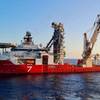U.S. Appetite For LNG Increases as Evidenced By 90% Leap In Imports
The import and use of Liquefied natural gas (LNG) in the U.S. has been staging a comeback. The country's two active import terminals are handling a rising number of tanker cargoes, with imports up 90 percent last year, and there are plans to re-launch two dormant terminals during the next two years. U.S. demand for natural gas is projected to rise strongly over the next decade, with most new power generation plants opting for gas because of economic and environmental benefits.
The four U.S. import terminals were built during the 1970s and reflected the energy conservation concerns of that era. Rising domestic supplies and deregulation, however, soon led to much lower natural gas prices and the U.S. market for imported LNG went the way of the lava lamp and bell-bottom pants. Today, concerns about domestic supplies have driven benchmark U.S. natural gas prices to more than $4 per thousand cubic feet, almost double the prices of a year ago, making imported LNG competitive with domestic sources.
CMS Energy Corp. which operates an import and re-gasification terminal at, Lake Charles, La., handled 27 incoming LNG cargoes last year compared with 17 in 1998 and has already received or contracted for 35 cargoes so far this year. Cabot Corp. received 44 cargoes at its terminal near Boston last year, up from 18 in 1998, reflecting the start of shipments from the Caribbean nation of Trinidad and Tobago under a 20-year supply contract. Cabot expects an additional 10 to 20 percent increase in import volumes this year and says it is running at about 60 to 70 percent of capacity. Until 1996 Algeria was the sole supplier of LNG to the United States, but in recent years cargoes have also been acquired from Australia, Abu Dhabi, Qatar, Malaysia, Trinidad and Nigeria.
Subscribe for
Maritime Reporter E-News
Maritime Reporter E-News is the maritime industry's largest circulation and most authoritative ENews Service, delivered to your Email five times per week













